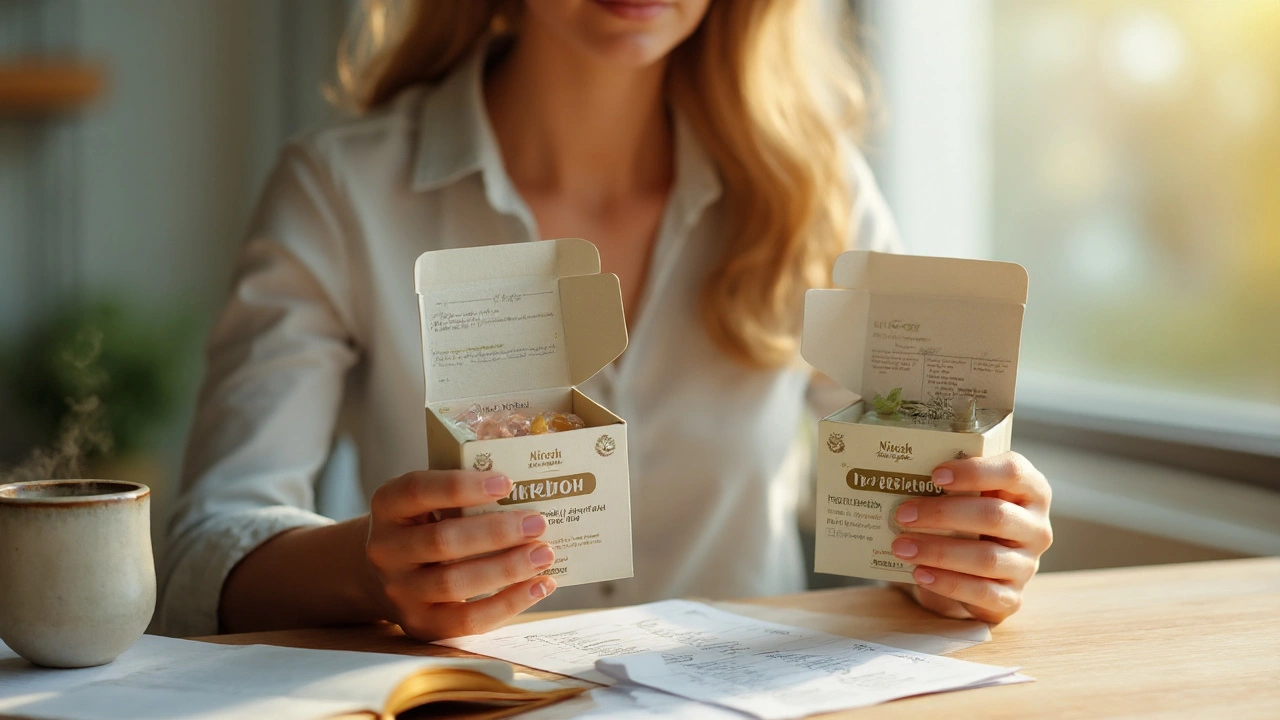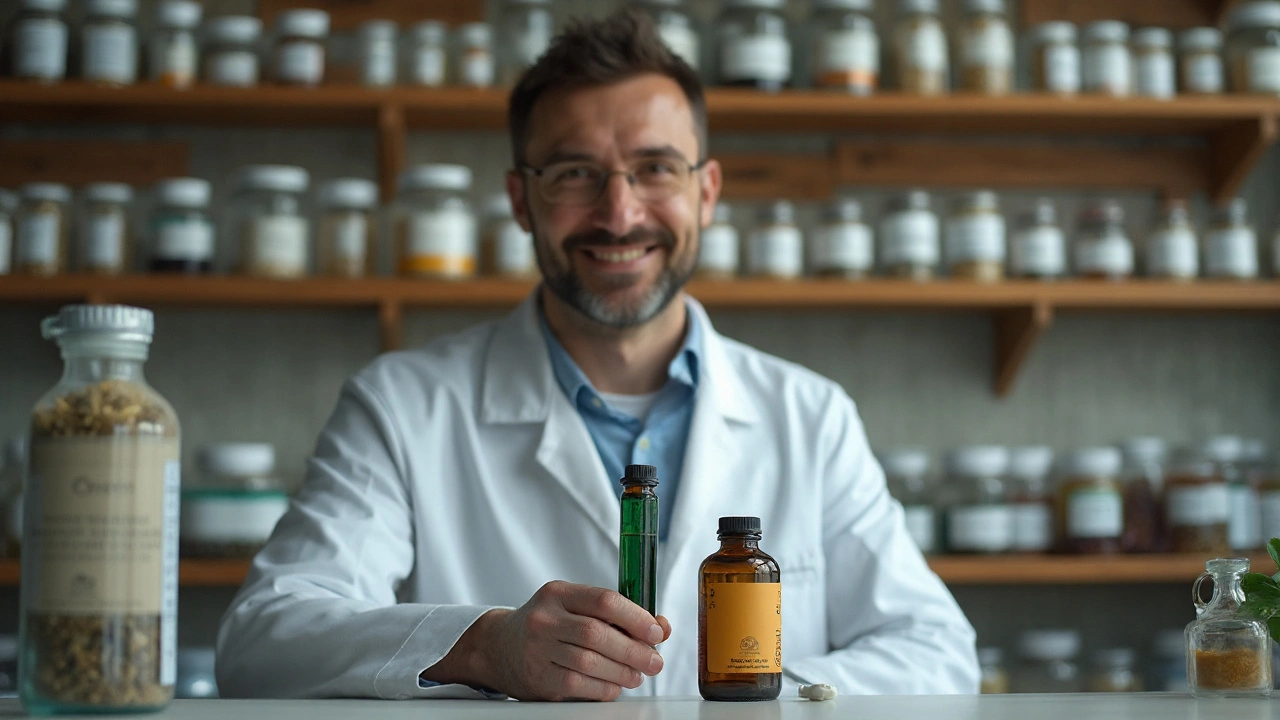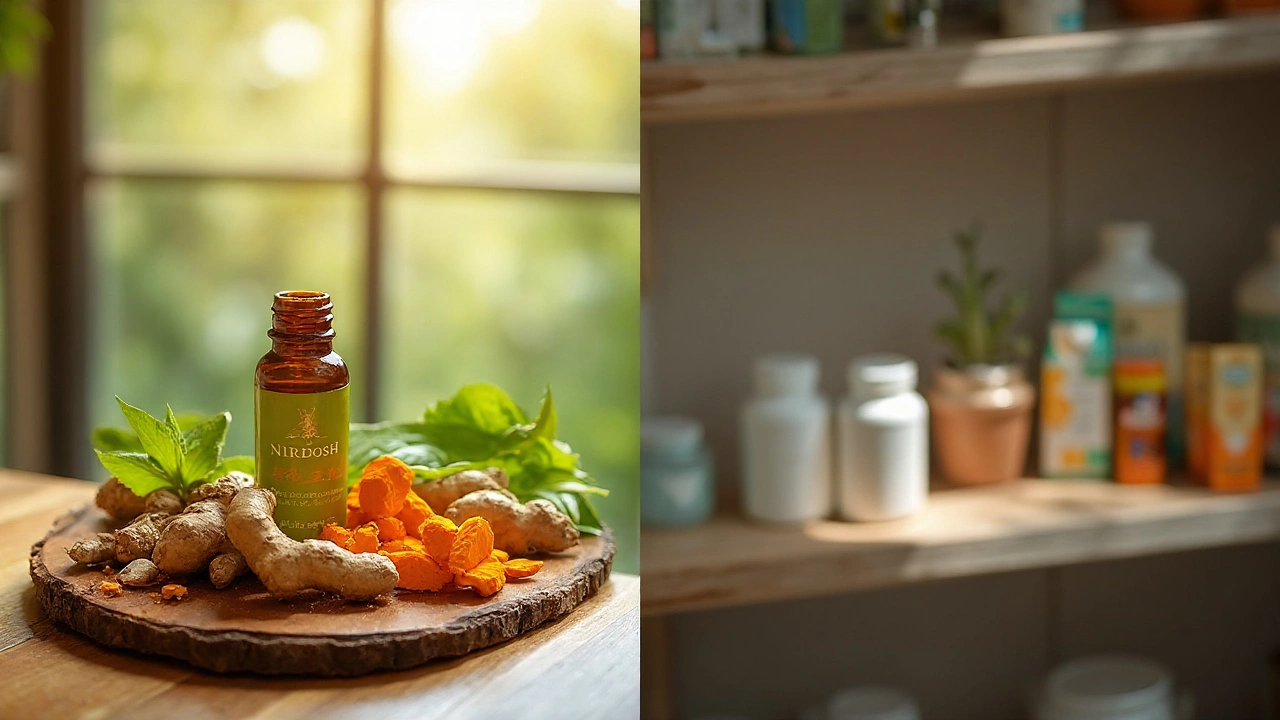Nirdosh Herbal Suitability Quiz
Nirdosh Herbal is a plant‑based dietary supplement marketed for immunity, stress relief and digestive balance. It blends turmeric, ashwagandha, holy basil and a few adaptogenic extracts, each standardized to a minimum active‑compound level. Manufactured in the UK under MHRA‑registered Good Manufacturing Practice, the formula targets adults seeking a non‑synthetic boost.
Why People Turn to Nirdosh
Consumers often cite three main reasons: a desire for a natural approach, concerns about synthetic drug side effects, and the convenience of an all‑in‑one capsule. Recent market surveys (2024) show that 42% of UK supplement buyers prefer herbal blends over single‑ingredient pills.
Key Attributes of Nirdosh
- Active ingredients: Turmeric (curcumin ≥95%), Ashwagandha (withanolides ≥5%), Holy Basil (eugenol ≥0.5%).
- Dosage: 2 capsules daily with meals, delivering roughly 500mg of total botanicals.
- Safety profile: No reported liver toxicity; mild gastrointestinal upset in <2% of users.
- Regulatory status: Classified as a food supplement under UK law, not a medicinal product.
Common Alternatives
When shoppers compare, they usually encounter three categories: other Ayurvedic brands, broad‑spectrum herbal lines, and conventional over‑the‑counter (OTC) options.
Ayurvedic Brand Leaders
Two big names dominate the UK shelf: Himalaya offers a Herbal Immunity+ formula that leans heavily on Giloy and Indian gooseberry. and Patanjali sells a Divya Shakti blend featuring amla, shankhapushpi and brahmi.
Broad‑Spectrum Herbal Lines
Brands like Garden of Life produce mykind Organics Stress Relief, a vegan, non‑GM blend that mixes ashwagandha, rhodiola and lemon balm.
Conventional OTC Choices
For a more pharmaceutical feel, many reach for Vitamin C tablets or low‑dose ibuprofen. While effective for acute inflammation, they lack the adaptogenic synergy of herbal blends.
Side‑by‑Side Comparison
| Attribute | Nirdosh Herbal | Himalaya Immunity+ | Patanjali Divya Shakti | Garden of Life Stress |
|---|---|---|---|---|
| Primary botanicals | Turmeric, Ashwagandha, Holy Basil | Giloy, Indian Gooseberry | Amla, Shankhapushpi, Brahmi | Ashwagandha, Rhodiola, Lemon Balm |
| Standardized actives | Curcumin≥95%, Withanolides≥5% | Giloy extract≥10% | Amla vitaminC≥30mg | Ashwagandha≥4% |
| Daily dose (capsules) | 2 | 2 | 3 | 2 |
| UK GMP certification | Yes | Yes | No (India‑based) | Yes |
| Price per month (GBP) | £18.99 | £21.50 | £15.75 | £22.40 |
| Reported side effects | Mild GI upset | Rare skin rash | None noted | Occasional insomnia |

How to Choose the Right Option
Think of the decision as a three‑step checklist:
- Identify your primary goal. Immune support? Stress relief? Digestive comfort?
- Match active compounds. If you need strong anti‑inflammatory power, curcumin (Nirdosh) shines. For antioxidant focus, amla (Patanjali) leads.
- Check safety and certification. UK‑registered GMP gives extra confidence for those wary of overseas sourcing.
Real‑World Use Cases
Emma, a 34‑year‑old graphic designer in Birmingham, swapped her nightly ibuprofen for Nirdosh during a stressful project. After two weeks she reported steadier energy and no stomach aches.
Raj, a 58‑year‑old retiree, prefers Patanjali for its high vitaminC content, helping him feel less prone to colds during winter.
Safety, Interactions & Regulatory Notes
The UK’s Medicines and Healthcare products Regulatory Agency (MHRA) treats herbal supplements as foods, meaning they aren’t subject to the same rigorous clinical trials as medicines. However, reputable brands submit ClinicalStudy data to back efficacy claims.
Key interaction warnings:
- Turmeric can amplify blood‑thinning effects; avoid combining with warfarin without doctor approval.
- Ashwagandha may lower blood sugar; diabetics should monitor levels.
- Holy basil may affect thyroid medication.
Overall, side‑effect rates remain under 3% for most reputable blends.
Cost‑Benefit Snapshot
When you break down the monthly price against the active‑compound yield, Nirdosh offers a competitive bang‑for‑buck. Curcumin at 95% purity costs roughly £0.03 per mg, whereas many lower‑grade supplements charge double for the same potency.
Related Concepts and Next Steps
Exploring Nirdosh opens doors to broader topics:
- Adaptogens - herbs that help the body resist stress.
- Bioavailability - how well an active compound is absorbed; black‑pepper extract in Nirdosh boosts curcumin uptake.
- Phytochemistry - the study of plant chemicals that drive health benefits.
If you liked this deep dive, consider reading about "How to Boost Herbal Bioavailability" or "Understanding Ayurvedic Dosage Principles" for the next step in your natural‑health journey.

Frequently Asked Questions
Is Nirdosh Herbal safe for long‑term use?
Yes, most users can take Nirdosh daily for six months or longer without serious issues. Annual medical reviews are advisable if you have chronic conditions or are on prescription medication.
How does Nirdosh compare to standard Vitamin C supplements?
Vitamin C delivers a single antioxidant boost, while Nirdosh combines anti‑inflammatory, adaptogenic and antioxidant actions in one capsule. For overall resilience, the multi‑herb blend often feels more balanced.
Can I take Nirdosh with blood thinners?
Turmeric may enhance anticoagulant effects, so consult your doctor before combining Nirdosh with warfarin, aspirin, or other blood‑thinning agents.
What makes Nirdosh’s curcumin more effective than generic turmeric capsules?
Nirdosh standardizes curcumin to ≥95% purity and adds piperine‑rich black‑pepper extract, which raises bioavailability by up to 2000% according to peer‑reviewed studies.
Is there a vegan version of Nirdosh?
All capsules are plant‑cellulose based, making the product fully vegan and gluten‑free.
How should I store Nirdosh to preserve potency?
Keep the bottle in a cool, dry place away from direct sunlight. A pantry shelf at 18‑22°C is ideal; refrigeration isn’t necessary.
Can Nirdosh replace my prescription anxiety medication?
Nirdosh can complement, but not replace, clinically prescribed anxiolytics. Discuss any changes with your healthcare provider.


Comments (20)
Dawn Mich
September 25, 2025 AT 04:40Wake up, people! The herbal supplement industry is a front for mind‑control chemicals hidden in turmeric extracts. If you think Nirdosh is safe, you're being fed lies by Big Pharma puppeteers.
Eric Sevigny
October 1, 2025 AT 00:06Honestly, Nirdosh looks decent. It has standardised doses of curcumin and ashwagandha, which are generally well‑tolerated. Just watch out for any stomach upset if you take it on an empty stomach.
Glenda Rosa
October 6, 2025 AT 19:33Let me school you all: the claim that a blend of turmeric, holy basil, and ashwagandha magically boosts immunity is pure marketing fluff. The bioavailability of curcumin is notoriously low unless paired with piperine, which this formula inexplicably omits. Moreover, adaptogens are not a panacea; they modulate stress hormones at best. If you seek real results, look for clinically‑backed dosages and third‑party testing. Otherwise, you’re just swallowing a pricey placebo.
charlise webster
October 12, 2025 AT 15:00Interesting take, but dismissing the entire product ignores the fact that many users report subjective improvements in energy and mood. Not every supplement has to be a miracle; incremental benefits count.
lata Kide
October 18, 2025 AT 10:26OMG 😱 this Nirdosh thing sounds like the holy grail of my wellness routine!!! 🌿✨ If it actually helps with stress, I'm all in. But pls tell me if there are any weird side‑effects, cuz I hate surprises.
Mark Eddinger
October 24, 2025 AT 05:53The previous comment is enthusiastic, but note the correct spelling: "supplement" not "suppliment", and avoid excessive exclamation marks in formal writing.
Francisco Garcia
October 30, 2025 AT 00:20I dug into the ingredient list and noticed the ashwagandha concentration is 5% withanolides, which is fairly standard. However, the capsule size delivers only about 250 mg of each herb per dose, which might be sub‑therapeutic for some users. If you’re already on prescription meds, double‑check for possible interactions, especially with blood thinners. For most healthy adults, two capsules a day should be safe, but keep an eye on any GI discomfort.
Patrick Renneker
November 4, 2025 AT 19:46In consideration of the prevailing discourse surrounding phytochemical supplementation, one must appraise the extant literature with scrupulous vigilance. The pharmacokinetics of curcumin, for instance, are notoriously impeded by first‑pass metabolism, thereby necessitating adjuvant agents to enhance systemic absorption. It is noteworthy that the formulation under scrutiny eschews such enhancers, potentially attenuating its purported efficacy. Nevertheless, the inclusion of holy basil, a reputed adaptogen, may confer ancillary benefits pertaining to cortisol modulation. Accordingly, while the product is not devoid of merit, its claims warrant tempered expectations.
KAYLEE MCDONALD
November 10, 2025 AT 15:13Sounds okay, but I’d stick with a known brand if you’re nervous about side effects.
Alec McCoy
November 16, 2025 AT 10:40Hey folks, just wanted to add that consistency is key with any supplement. Even if the effects seem subtle at first, taking Nirdosh daily for a month can reveal whether it truly helps you feel more balanced. Pair it with a solid diet and regular sleep, and you’ll maximize any potential benefits. Also, don’t forget to stay hydrated – water helps with absorption of the botanicals. Keep sharing your experiences; community feedback is gold!
Aaron Perez
November 22, 2025 AT 06:06One must contemplate the metaphysical implications of ingesting botanical compounds; are we merely consuming plant matter, or are we partaking in an ancient alchemical ritual? ;)
William Mack
November 28, 2025 AT 01:33Quick note: always check the expiration date before buying.
Evan Riley
December 3, 2025 AT 21:00The pharma cartel is definitely lurking behind every “natural” label. If you want true health, you need to stay off all these engineered supplements – they’re just a way to keep you dependent.
Nicole Povelikin
December 9, 2025 AT 16:26i think its ok but read the label carefuly if any allergen shows up
Michelle Weaver
December 15, 2025 AT 11:53From a clinical standpoint, the standardisation of active compounds is a positive attribute. However, prospective users should consider possible interactions with anticoagulants. 😊 Always consult a healthcare professional before starting a new supplement regimen.
John Keough
December 21, 2025 AT 07:20I appreciate the balanced view. It’s good to weigh both the potential benefits and the limitations. Personal experiences vary, so monitoring your own response is essential.
Riley Fox
December 27, 2025 AT 02:46Philosophically speaking, the act of consuming herbs taps into an ancient human‑environment relationship; yet, commercializing this bond often dilutes its authenticity-do you agree? ;)
John Magnus
January 1, 2026 AT 22:13From a pharmacodynamic perspective, the synergistic matrix of curcumin, withanolides, and eugenol may engender allosteric modulation of NF‑κB pathways. In lay terms, that could translate to modest anti‑inflammatory effects, provided the bioavailability hurdle is overcome.
Marc Clarke
January 7, 2026 AT 17:40Stay chill, give it a try, and let us know if you feel any difference. Positive vibes only!
Francisco Garcia
January 13, 2026 AT 13:06When evaluating any nutraceutical, it is prudent to adopt a systematic approach. First, verify the source of the botanical ingredients; reputable manufacturers will provide certificates of analysis confirming potency and purity. Second, consider the extraction method – CO₂ extraction typically yields higher concentrations of active phytochemicals compared to water or ethanol extractions, which may affect efficacy. Third, assess the presence of excipients; some formulations include fillers or binders that could trigger sensitivities in susceptible individuals. Fourth, examine the dosage regimen, noting whether the recommended daily intake aligns with dosing parameters demonstrated in peer‑reviewed studies. Fifth, cross‑reference any claimed health benefits with clinical evidence; for example, meta‑analyses on curcumin suggest modest improvements in inflammatory markers, but these outcomes are dose‑dependent and often require adjunctive agents like piperine.
Sixth, scrutinise potential drug‑herb interactions. Ashwagandha, while generally safe, may potentiate the effects of sedatives or hypotensive agents, whereas holy basil could influence thyroid hormone metabolism. Seventh, check for transparent labeling – clear ingredient lists, batch numbers, and expiry dates reflect manufacturing accountability.
Eighth, consider personal health status; individuals with hepatic or renal impairment should exercise caution and perhaps consult a qualified practitioner before initiating any new supplement. Ninth, observe how the supplement fits into your broader lifestyle – adequate sleep, balanced nutrition, and regular physical activity synergise with any herbal aid.
Tenth, monitor your body's response over a reasonable trial period, typically four to six weeks. Document any subjective changes in energy, mood, or digestive comfort, and remain vigilant for adverse effects such as GI upset, rash, or unexpected fatigue. If negative symptoms arise, discontinue use and seek medical advice.
In summary, a diligent, evidence‑based evaluation, coupled with personal monitoring, will empower you to make an informed decision about incorporating Nirdosh Herbal into your regimen.